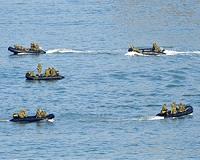| . |  |
. |
Moscow (AFP) April 27, 2010 An agreement ratified Tuesday by the Russian and Ukrainian parliaments extending by 25 years Russia's lease on the port of Sevastopol comes after years of conflict between Kiev and Moscow on the issue. The Crimean port, where the Russian Black Sea Fleet is based, is strategically important for Russia as it gives it an opening onto the Black Sea. The history of the Black Sea Fleet goes back to 1783, when the Crimea was annexed by Russia under Catherine the Great who founded the port of Sevastopol. Along with the rest of the Crimean peninsula, the port was attached to Soviet Ukraine in 1954 by then Soviet leader Nikita Krushchev. With 16,200 men under arms, the Black Sea Fleet comprises some 40 warships, including the cruiser Moskva, which took part in the Russia-Georgian war of 2009, as well as several submarines and aircraft-carriers. As soon as the Soviet Union imploded in 1991, the issue of the fleet became an irritant in relations between Kiev and Moscow, with an independent Ukraine demanding part of the former Soviet fleet. After months of dispute, presidents Boris Yeltsin of Russia and Leonid Kravchuk of Ukraine met in the Crimean town of Yalta in August 1992 and signed an agreement to run until 1995. It provided for the fleet to remain undivided, and did not bring the quarrels to an end. On May 31, 1997 in Kiev, Yeltsin and the new Ukrainian president, Leonid Kuchma, signed an agreement under which Moscow would lease the Sevastopol facilities for 20 years, at around 100 million dollars a year. Under the agreement, Ukraine obtained 18 percent of the fleet, with the rest remaining Russian. The rental was to be deducted from Ukraine's debts to Russia for gas supplies. The conflicts nevertheless continued. In August 2008, in particular, the Ukrainian leadership issued a decree restricting the movements of the Russian fleet, which was involved in the armed conflict with Georgia. This angered Moscow. Viktor Yushchenko, predecessor of the current Ukrainian President Viktor Yanukovych, had suggested that the Russian fleet should leave Sevastopol when the agreement expired. But after winning power earlier this year, Yanukovych pledged to allow the fleet to stay after the 2017 expiry date.
Share This Article With Planet Earth
Related Links Naval Warfare in the 21st Century
 US cautious after SKorea suggests torpedo sunk warship
US cautious after SKorea suggests torpedo sunk warshipWashington (AFP) April 26, 2010 The United States on Monday reacted cautiously to remarks from a cabinet minister in Seoul suggesting a torpedo sunk a South Korean warship near the disputed border with North Korea. "I think it was a conditional statement" by South Korea's defense minister, State Department spokesman Philip Crowley told reporters. "I don't know that the investigation has arrived at that final judgment." ... read more |
|
| The content herein, unless otherwise known to be public domain, are Copyright 1995-2010 - SpaceDaily. AFP and UPI Wire Stories are copyright Agence France-Presse and United Press International. ESA Portal Reports are copyright European Space Agency. All NASA sourced material is public domain. Additional copyrights may apply in whole or part to other bona fide parties. Advertising does not imply endorsement,agreement or approval of any opinions, statements or information provided by SpaceDaily on any Web page published or hosted by SpaceDaily. Privacy Statement |